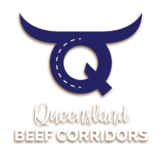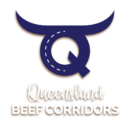Beef producers and industry stakeholders who have shared in the call to action for upgraded road infrastructure come from one of the most diverse beef producing areas in the country.
From large western plains uniquely suited to organic production to high-performance feedlots, in Central and Western Queensland, just like there’s a cut for every dish, there’s a niche for every producer, processor and service provider along the beef supply chain.
Bernadette Paine, Beef producer
Third generation graziers Matthew and Bernadette Paine are no strangers to beef industry advocacy.
The couple oversees ‘Myola’, a 7000-hectare cattle property situated between Springsure and Tambo running about 2500 head. The Paine’s family operation may be small but that hasn’t stopped them from embracing technology and adapting their business model to suit the changing market.
The operation is now trucking out about 600 head a year and is breeding premium European Union accredited, organic, MSA and grassland certified beef.
In 2016, they helped form the Upper Nogoa Community Group; a collective voice of passionate local producers and road users calling on all levels of government to seal the Dawson Development Road.
Bernadette believes the modern producer needs to be malleable and flexible to ensure a secure and prosperous future – for themselves, their children, and the Queensland economy.
She says it hinges on getting the infrastructure right. A reliable road network means an opportunity for business diversity and growth.
Fred Appleton, Organic beef producer
Nuffield Scholar and beef producer Fred Appleton has travelled extensively to research the competitive advantage of Australian producers and low-intensity grazing that produces a quality grass-fed product.
The Appleton family enterprise is based on 106,837 hectares north of Alpha but has other properties stretching from Charters Towers out to Hughenden. Their breeding and fattening beef operation of around 40,000 head is fully organic and employs 25 people.
Fred’s research indicates that the northern beef industry is poised to meet the contemporary demands of consumers if it can work together; pivot to adapt to the market; and recognise the importance of telling the story behind the product.
Harry and David Kemp, Feedlot operators
Harry and David Kemp oversee a diverse and data-driven family beef production operation in the Isaac region.
Their enterprise employs up to 12 staff and is spread across three properties that also includes a 6000–head feedlot.
Performance focussed and self-sufficient, the Kemps grow irrigated feed; breed, background and finish more than 10,000 head of cattle a year; and transport livestock.
Mixing tradition with technology, they rely on data for decision–making, managing budgets and driving results. Harry places emphasis on end-product performance but also sees value in analysing reproductive capacity, mating periods, temperament, and environmental influences to maximise profitability.
He says that good roads are the heart of the business—to source grain, supplies and equipment, and to get their premium product to market.
Gerard Johnson, Livestock transporter
Livestock and Rural Transporters Association of Queensland president and Tambo transport operator Gerard Johnson is a professional truck driver. His business is livestock and general freight carrying with more than 20 years of industry experience.
Gerard is passionate about driver safety, the efficiency of operations, animal welfare outcomes and transport productivity.
Ethan Mooney, Teys Australia General Manager Biloela Operations
Ethan Mooney and Teys Australia are the producer/manufacturer link in the Central Queensland beef production supply chain.
After completing a degree in Animal and Veterinary Bioscience, Ethan began his seven-year association with the 70-year old company as a trainee livestock buyer. He moved to livestock manager at Rockhampton, completed a business degree and MBA, and is currently general manager of the Biloela operation.
Teys has six beef processing facilities on the eastern seaboard of Australia, with each location chosen because of its close proximity to prime cattle producing regions.
The company partners with more than 7000 dedicated producers across Australia and prides itself on providing fresh beef products with a ‘real difference—consistent, high quality and traceable from paddock to plate’.
Ethan Mooney and Teys join the conversation because improved transport and animal welfare conditions are important to ensure a high standard of product to the consumer.

